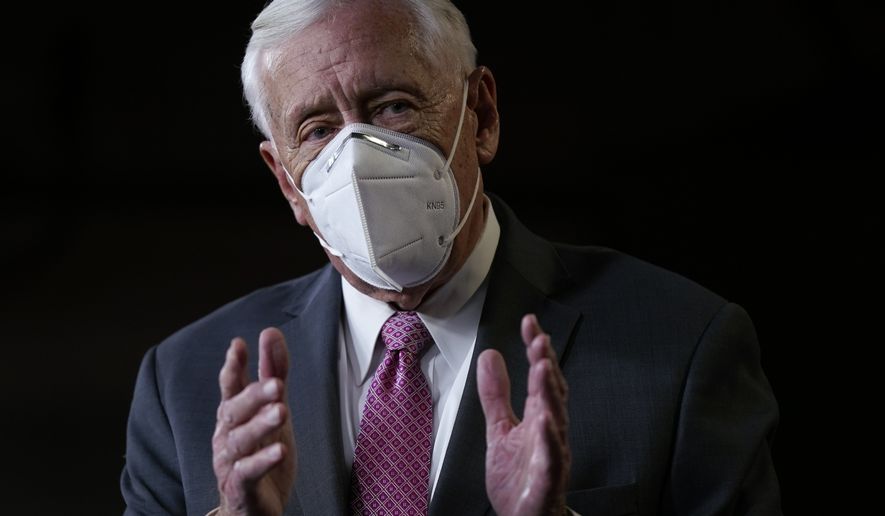House Democrats forced through a short-term funding measure Tuesday to keep the government afloat and prevent a default on U.S. debts, setting up a standoff with Senate Republicans.
In a 220-211 party-line vote, House Speaker Nancy Pelosi secured passage of the bill after tying it to disaster aid and increased funding for Afghan refugees resettlement.
“It is essential that we keep the government open,” said Mrs. Pelosi, California Democrat.
As part of the package, House Democrats are seeking to fund the government through Dec. 3. Federal funding is officially set to run out Sept. 30, the deadline to pass an annual budget, which Congress will miss again this year.
Mrs. Pelosi’s bill also suspends the federal debt-ceiling until December 2022. Democrats say that suspending the cap on how much the government can borrow to pay for federal expenditures, like bureaucratic salaries and Social Security, is needed to prevent the economy from cratering.
“Our country will suffer greatly if we do not act now to stave off this unnecessary and preventable crisis,” said House Majority Leader Steny H. Hoyer, Maryland Democrat.
Despite passing the House, the stop-gap funding bill faces longs odds in the Senate because of Mrs. Pelosi’s insistence on including the debt-ceiling suspension.
Republicans have ruled out providing the votes necessary to ensure any debt-ceiling hike overcomes the Senate’s 60-vote filibuster threshold.
Senate Minority Leader Mitch McConnell argued that if Democrats were content to pass a $3.5 trillion spending bill on party-line votes, they should also be responsible for raising the debt ceiling to make that spending possible.
“What we’re not prepared to do is to relieve the Democratic president, the Democratic House and Senate from their governing obligation to address the deficit,” said Mr. McConnell, Kentucky Republican.
GOP lawmakers are urging Democrats to deal with the debt ceiling using budget reconciliation.
The process, which Democrats are using to pass Mr. Biden’s $3.5 trillion package, allows some spending and tax measures to avoid a filibuster and pass with a simple majority of 51 votes, including the tie-breaking vote of Vice President Kamala D. Harris.
Senate Majority Leader Charles E. Schumer, New York Democrat, claims the tactics amount to “playing with fire.”
Republicans, though, are not sold on the need to bail out Democrats on the debt-ceiling. At the moment only four GOP senators are seen as likely to back the Democratic bill.
Two of those Republican lawmakers, Sens. Bill Cassidy and John Kennedy, hail from Louisiana, which was hit hard by Hurricane Ida earlier this month. Mr. Kennedy has already signaled that he will back the bill because of the disaster aid.
“I need the help,” Mr. Kennedy said. “My people, I mean those in Southwest Louisiana … got hit with one of the most powerful storms that we’ve ever experienced.”
The majority of Republicans, however, are opposing the Democrats’ gambit. Even moderates, like Sen. Mitt Romney, are lining up behind Mr. McConnell and GOP leadership on the issue.
“They don’t want a single Republican vote on spending measures, but they think we should have to raise the debt limit for them,” said Mr. Romney, Utah Republican. “The Democrats could solve that problem all by themselves. They have the House, the Senate and the White House.”
Given that the Senate is split evenly between both parties, Democrats are unlikely to find the 10 GOP votes necessary to overcome a filibuster.
Despite the reality, Democrats are unwilling to entertain the idea as it would for them to specify a new, higher ceiling. Many, especially vulnerable Democrats already facing tough reelection bids, don’t want to be on record for raising the federal debt cap above the current limit of $28.5 trillion.
“We can do it through reconciliation. Leadership has said they don’t want to do that,” said House Budget Committee Chairman John Yarmuth, Kentucky Democrat, on MSNBC. “The reason is if we do that through reconciliation, we actually have to specify a number.”
With Democrats unwilling to act unilaterally and Republicans not ready to compromise, a government shutdown and possible default on U.S. debts appear increasingly likely.
Treasury Secretary Janet Yellen has warned that Congress must raise the debt ceiling by mid-October for the government to continue paying its bills.
“We have learned from past debt limit impasses that waiting until the last minute to suspend or increase the debt limit can cause serious harm to business and consumer confidence, raise short-term borrowing costs for taxpayers, and negatively impact the credit rating of the United States,” Ms. Yellen wrote in a letter to congressional leaders.
• Haris Alic can be reached at halic@washingtontimes.com.




Please read our comment policy before commenting.